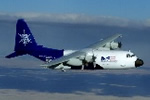 |
- News
- Information for PIs (coming soon)
- Deployment History
- Photo Gallery (coming soon)
|
The NSF/NCAR C-130 is a four-engine, medium-size utility aircraft which has proven to be one of the most versatile research aircraft ever built. It has a 10-hour flight endurance, a 2,900 nautical mile range at up to 27,000 ft, and a payload capacity of up to 13,000 lbs. In addition to standard thermodynamic, microphysics and radiation sensors, the C-130 has a roomy fuselage payload area (414 ft2) and many versatile inlets and optical ports. The aircraft carries instruments and sensors in pods and pylons on both wings. The C-130 can carry advanced EOL and community instrumentation.
The C-130 serves a wide variety of investigatory needs
As part of NSF's fleet of research aircraft for the last 12 years, the versatile and capable C-130 carries a wide variety of scientific payloads in support of atmospheric research in the areas of Atmospheric Boundary Layer Surveys, Oceanographic Investigations, Air/Sea Interaction Measurements, Cloud Physics Studies, Tropospheric Profiling, Radiometric Measurements, Satellite Ground Truth, Atmospheric Chemistry Sampling and Aerosol Measurements.
|

